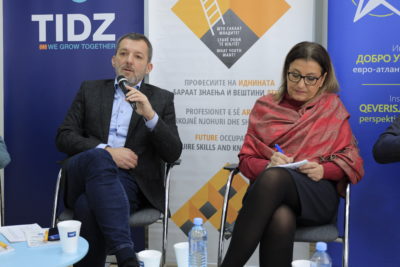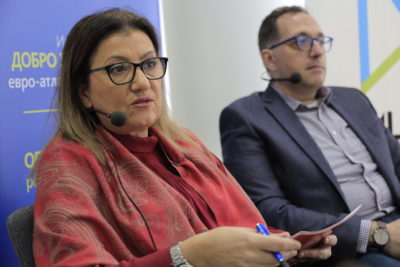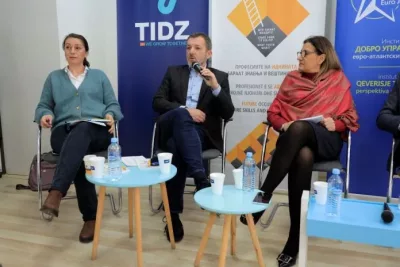DESPOTOVSKI – TIDZ SUPPORTS YOUTH SKILLS DEVELOPMENT PROGRAMS
Young people want flexible working hours, remote work and conditions for a quality life according to their measure, and the state should more actively involve them in decision- making and policy-making in order to have motivated youth to stay in the country – these are some of the conclusions of the second public debate dedicated to raising public awareness of youth unemployment organized by the Institute for Good Governance and Euro-Atlantic Perspectives (IDUEP), in cooperation with the Ministry of Labor and Social Policy (MTSP) and the Directorate for Technological Industrial Development Zones (TIDZ).
making and policy-making in order to have motivated youth to stay in the country – these are some of the conclusions of the second public debate dedicated to raising public awareness of youth unemployment organized by the Institute for Good Governance and Euro-Atlantic Perspectives (IDUEP), in cooperation with the Ministry of Labor and Social Policy (MTSP) and the Directorate for Technological Industrial Development Zones (TIDZ).
The Minister of Labor and Social Policy, Jovana Trenchevska, emphasized that the Government has a systemic approach in solving the challenges faced by young people, through the implementation of employment policies and the adoption of special laws, taking into account changes in the labor market and innovations in the business sector. and jobs. Trenchevska also announced changes to the Law on Labor Relations, which will meet the demands of young people.
“In the last period, we have been talking more loudly about the new Law on Labor Relations, in which,with the introduction of the
possibility of working from home and remote work, it is precisely the young people with acquired digital skills and knowledge who will have the greatest benefit and are the ones who will enable them to be placed more on the open labor markets throughout Europe”, said the Minister of Labor and Social Policy.
She indicated that the Government, through the implementation of youth policies, contributed to the reduction of youth unemployment, from 43.2 percent in 2015 to 24.3 percent in the second quarter of 2022. The minister called on young people to be more vocal in their demands and to get involved with their proposals in policy making.
Corruption is one of the main factors that encourage young people to leave, Biljana Stojcheska from the Youth Union pointed out. Their latest Youth Unemployment Project survey found that 90 percent of young people want to move out.
“The focus should be changed from employment only to providing quality living conditions. What is worrying is that the percentage of poverty among young people is high – 24.6 percent or every fourth young person in the country faces poverty. One third of social assistance beneficiaries are young. We do not have an action plan on how to build a quality life for young people in our society. We can provide super skills for future professions for young people, however, what if young people do not have a quality life? All of us as a society should focus on young people, work for young people together with young people, listen to their needs, and that’s how we will keep young people at home,” says Stojcheska.
The director of TIDZ, Jovan Despotovski, believes that education reform is necessary, but that there is room with concrete measures to support the youth in the country and to invest in the development of their skills.
“Since the beginning of the year, we have opened more than 2,500 new jobs, however, there is still potential for growth and it should be used. These jobs are mainly for young people, but it is important to give young people much more space, apart from the opportunity to get a good job and earn a decent salary.
In the past year and a half, we had several advertisements for paid internships where about 15 young people were hired. It sounds like it is not much, but if you take into account that there are sixty people hired in the Directorate of TIDZ, it indicates that almost a quarter of the people who were hired are young people – students. “We offered all these young people the opportunity after completing the internship to stay and work and change things from within the institution,” said Despotovski.
He also pointed out that since last year TIDZ has introduced the possibility for companies with the support of the state to implement programs for developing skills for young people, who within these companies can further develop skills that they did not acquire in formal education.
The President of the University Assembly at UKIM, Slavcho Temelkovski, emphasized that one of the main goals for improving the employment situation among young people is to work on the introduction, but also the promotion of measures and programs intended for young people in order to improve youth awareness.
“The main initiative should be shifted to all the more serious stakeholders who can contribute and focus more on targeting young people with all the benefits they can have with the Internship Law, the Labor Law, which they can get with the National strategy for young people and the like, how to establish their own startup and the like,” Temelkovski said.
Bojan Kordalov, communicator and coordinator of the Program at IDUEP believes that a joint strategy of all social actors at the central and local level is urgently needed, and which will include all stakeholders in order to stop the devastating trend of emigration of young people which, among other things, it shows that over 500,000 young people have left the country in the last 20 years.
“We are talking about the lack of qualified workforce, these are the most common messages that we hear in the public. And that is the result of the mass emigration of young workers to Western European countries and the United States. If we want to change this situation as a country, we are definitely on the wrong path and the numbers clearly show that. This will not be improved by partisan bickering or by arguing who is wrong and who is right. The effect these decades has been devastating. We need conversation and dialogue, as well as joint work with young people. There is no success, no community or progress if corruption is not suppressed, which apparently forces them to emigrate. There is no success if there is no political cooperation and joint action between all political actors, and in the interest of the youth. On the contrary, we will only continue to sink and see apathy,” emphasized Kordalov.
He added that at the end of this year all the recommendations will be put in one document that will be delivered to the government representatives and the municipalities who are expected to integrate them into their policies and implement them because it is in the interest of the whole country.
This is the second in a series of public debates about what kind of youth profiles the labor market needs, but also how companies should invest in developing the appropriate skills and knowledge of employees. The debates are within the framework of the project “What young people want – The professions of the future require skills today” which is implemented by the Institute for Good Governance and Euro-Atlantic Perspectives. This project is sub-granted by the “Ana and Vlade Divac” foundation, the Krushevo Youth Union and 3 partner organizations from the region, and financed by the European Union.





